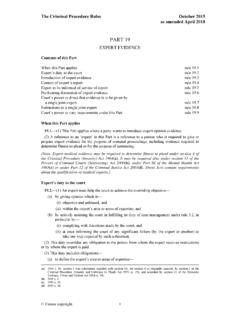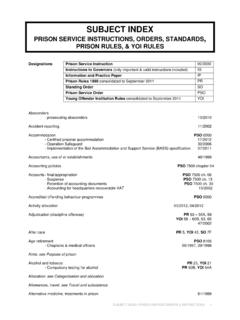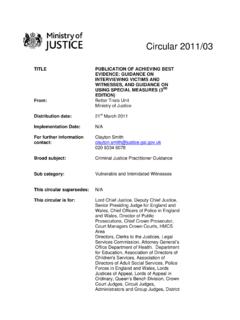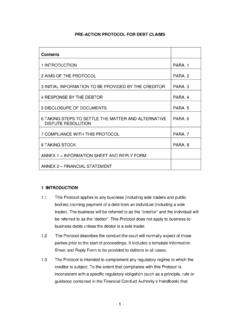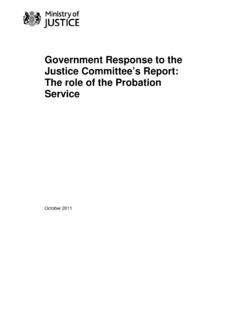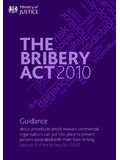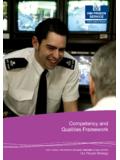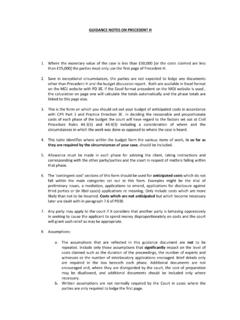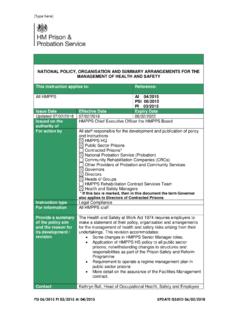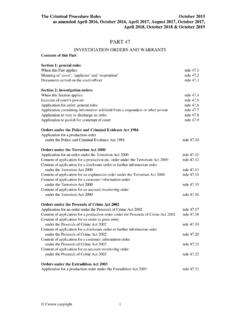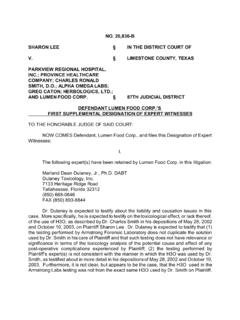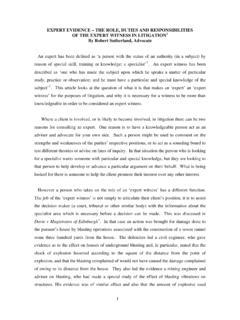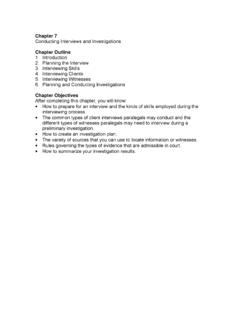Transcription of Protocol for the Instruction of Experts to give …
1 Protocol for the Instruction of Experts to give Evidence in Civil Claims June 2005 amended October 2009 CONTENTS Page No. 1. 3 2. Aims of 3 3. 4 4 4. Duties of 5 5. Conduct of Experts Instructed only to 6 6. The Need for 7 7. The Appointment of 7 Conditional and Contingency 9 8. 9 9. Experts Acceptance of 10 10. 11 11. Experts Right to ask Court for 11 12. Power of the Court to Direct a Party to Provide 12 13. Contents of Experts 12 13 13 Reliance on the work of 14 14 Range of 14 15 Basis of report: material 15 14.
2 After Receipt of Experts 15 15. Amendments of 16 16. Written Questions to 17 1 Written requests for directions in relation to 17 17. Single Joint 18 Joint 18 Conduct of the single joint 19 20 18. Discussions between 20 Arrangements for discussions between 21 19. Attendance of Experts at 23 2 Protocol for the Instruction of Experts to give evidence in civil claims 1. Introduction expert witnesses perform a vital role in civil litigation. It is essential that both those who instruct Experts and Experts themselves are given clear guidance as to what they are expected to do in civil proceedings.
3 The purpose of this Protocol is to provide such guidance. It has been drafted by the Civil Justice Council and reflects the rules and practice directions current [in June 2005], replacing the Code of Guidance on expert Evidence. The authors of the Protocol wish to acknowledge the valuable assistance they obtained by drawing on earlier documents produced by the Academy of Experts and the expert Witness Institute, as well as suggestions made by the Clinical Dispute Forum.
4 The Protocol has been approved by the Master of the Rolls. 2. Aims of Protocol This Protocol offers guidance to Experts and to those instructing them in the interpretation of and compliance with Part 35 of the Civil Procedure Rules (CPR 35) and its associated Practice Direction (PD 35) and to further the objectives of the Civil Procedure Rules in general. It is intended to assist in the interpretation of those provisions in the interests of good practice but it does not replace them.
5 It sets out standards for the use of Experts and the conduct of Experts and those who instruct them. The existence of this Protocol does not remove the need for Experts and those who instruct them to be familiar with CPR35 and PD35. Experts and those who instruct them should also bear in mind para of the Practice Direction on Protocols which contains the following objectives, namely to: (a) encourage the exchange of early and full information about the expert issues involved in a prospective legal claim; 3(b) enable the parties to avoid or reduce the scope of litigation by agreeing the whole or part of an expert issue before commencement of proceedings.
6 And (c) support the efficient management of proceedings where litigation cannot be avoided. 3. Application This Protocol applies to any steps taken for the purpose of civil proceedings by Experts or those who instruct them on or after 5th September 2005. It applies to all Experts who are, or who may be, governed by CPR Part 35 and to those who instruct them. Experts are governed by Part 35 if they are or have been instructed to give or prepare evidence for the purpose of civil proceedings in a court in England and Wales (CPR ).
7 Experts , and those instructing them, should be aware that some cases may be "specialist proceedings" (CPR 49) where there are modifications to the Civil Procedure Rules. Proceedings may also be governed by other Protocols. Further, some courts have published their own Guides which supplement the Civil Procedure Rules for proceedings in those courts. They contain provisions affecting expert evidence. expert witnesses and those instructing them should be familiar with them when they are relevant.
8 Courts may take into account any failure to comply with this Protocol when making orders in relation to costs, interest, time limits, the stay of proceedings and whether to order a party to pay a sum of money into court. Limitation If, as a result of complying with any part of this Protocol , claims would or might be time barred under any provision in the Limitation Act 1980, or any other legislation that imposes a time limit for the bringing an action, claimants may commence proceedings without complying with this Protocol .
9 In such circumstances, 4claimants who commence proceedings without complying with all, or any part, of this Protocol must apply, giving notice to all other parties, to the court for directions as to the timetable and form of procedure to be adopted, at the same time as they request the court to issue proceedings. The court may consider whether to order a stay of the whole or part of the proceedings pending compliance with this Protocol and may make orders in relation to costs. 4. Duties of Experts Experts always owe a duty to exercise reasonable skill and care to those instructing them, and to comply with any relevant professional code of ethics.
10 However when they are instructed to give or prepare evidence for the purpose of civil proceedings in England and Wales they have an overriding duty to help the court on matters within their expertise (CPR ). This duty overrides any obligation to the person instructing or paying them. Experts must not serve the exclusive interest of those who retain them. Experts should be aware of the overriding objective that courts deal with cases justly. This includes dealing with cases proportionately, expeditiously and fairly (CPR ).
